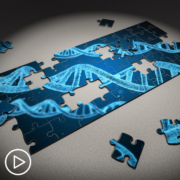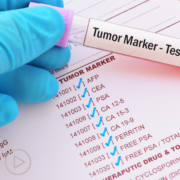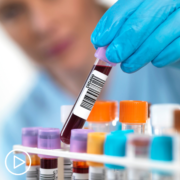How Is Advanced Prostate Cancer Treatment Personalized?
How Is Advanced Prostate Cancer Treatment Personalized? from Patient Empowerment Network on Vimeo.
Tests results, including results of biomarker testing, may help to personalize advanced prostate cancer treatment. Expert Dr. Xin Gao shares an overview of the testing that patients should undergo and how the results are used in determining a treatment plan for optimal care.
Dr. Xin Gao is a Medical Oncologist at Massachusetts General Hospital. Learn more about this expert Dr. Gao.
See More From INSIST! Prostate Cancer
Related Resources

|

Establishing Treatment Goals: What Are Options for Advanced Prostate Cancer Therapy? |

|
Transcript:
Katherine:
I’d like to talk about what goes into deciding on a treatment path. What testing is used to understand a patient’s individual disease?
Dr. Gao:
There is a lot of testing that we do for – to try and characterize a patient’s individual disease and try to select an optimal management strategy for their specific cancer and their specific situation.
We look at the biopsy, the pathology. The most common type of prostate cancer is called adenocarcinoma, but rarely we see certain other types under the microscope, things like neuroendocrine or small cell prostate cancers that tend to be treated in a different way. We look at things like the Gleason score.
That tells us a bit more about sort of the aggressiveness of this cancer, as well as the PSA, you know, it’s a very good correlate for how the cancer is doing in general once somebody has been diagnosed with prostate cancer. For imaging tests, we commonly rely on imaging. We look at prostate MRIs to get an idea of the local extent of the prostate tumor. We get things like bone scans and CAT scans to look at the entire rest of the body to see if or where the cancer may have spread to.
And there are newer imaging tests like the PSMA PET scan, which we commonly use now, which is a much more sensitive test for detecting prostate cancer in 2023 compared to traditional scans like CAT scans and bone scans. I also commonly make use of genetic testing and molecular information.
So, for any patient with an advanced prostate cancer, I do recommend both what we call a germline test, which is testing for inherited cancer genes that a patient could have gotten from the parents and pass onto their kids, as well as somatic testing, which is testing the cancer itself to see what genetic mutations or alterations might’ve developed within their cancer. And that can actually factor into certain treatments that the patient may or may not be more likely to benefit from if they have these genetic mutations.
Katherine:
Dr. Gao, a patient sent in this question prior to the program. What other genetic testing, beside BRCA markers, are important for deciding future targeted therapies and how are each of them used?
Dr. Gao:
Yeah, that’s a great question. Targeted therapies have been used in a lot of different cancers and it’s only really within the past few years that we’re using them as a standard of care routinely in prostate cancers. So, BRCA2 and BRCA1 mutations are some of the more common mutations or genetic alterations that are targetable in prostate cancer. Recently, there have been multiple FDA approvals of different drugs that are called PARP inhibitor, which are able to target the cancer if they have BRCA1 or BRCA2 mutations.
Beyond BRCA2 and BRCA1, there’s a panel of what’s called homologous recombination repair genes and that’s defined differently in varying extents, depending on the specific drug. That has been FDA approved, but in general, it’s about 12 to 14 genes total and they actually include the BRCA2 and BRCA1 genes.
So, some of the ones that have been…it seems like the data shows maybe more activity or better efficacy with these PARP inhibitors include a gene called PALB2, P-A-L-B 2. It’s not a very common mutation that we see, but it is something that we should look for because even if it’s not common overall for the patient who has it, it could be a very helpful and useful gene to know that that they have and it certainly would warrant treatment with a PARP inhibitor.
The other sort of dozen or so…10-12 genes in this homologous recombination repair pathway, the data, I would say, is still early and it is still somewhat limited in terms of how much people with those gene mutations truly benefit from these PARP inhibitors, but I do think it’s important to look for them, to know that if they do have one of these genetic mutations that it does make a PARP inhibitor an option for them. And then, beyond these HRR genes, I always look for something called a microsatellite instability or mismatched repair deficiency. These are sort of genetic features or really a panel of about four genes involved in a cellular process called – a DNA repair process called mismatch repair.
For those patients that have either mismatched repair deficiency or microsatellite instability high cancers, I do recommend that they consider an immunotherapy medication called pembrolizumab which is FDA-approved regardless of cancer type for any MSI high or mismatched repair cancer and they’ve shown pretty solid activity for those kinds of cancers.



















